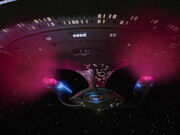No edit summary |
No edit summary |
||
| Line 21: | Line 21: | ||
In [[2375]], [[Commander]] [[William Riker]] used the Bussard collectors of the [[USS Enterprise (NCC-1701-E)|USS ''Enterprise-E'']] to collect [[metreon]] gas, before venting the Bussard collector between themselves and the attacking [[Son'a]] vessels, a maneuver which Geordi nicknamed the [[Riker Maneuver]]. ({{film|9}}) |
In [[2375]], [[Commander]] [[William Riker]] used the Bussard collectors of the [[USS Enterprise (NCC-1701-E)|USS ''Enterprise-E'']] to collect [[metreon]] gas, before venting the Bussard collector between themselves and the attacking [[Son'a]] vessels, a maneuver which Geordi nicknamed the [[Riker Maneuver]]. ({{film|9}}) |
||
| − | In [[2376]], the Bussard collectors of the [[USS Voyager]]were modified to gather [[deuterium]] from a [[J class nebula]]. ({{VOY|Unforgettable|The Haunting of Deck Twelve}}) |
+ | In [[2376]], the Bussard collectors of the [[USS Voyager]] were modified to gather [[deuterium]] from a [[J class nebula]]. ({{VOY|Unforgettable|The Haunting of Deck Twelve}}) |
==Background== |
==Background== |
||
Revision as of 03:05, 9 January 2008

Sovereign class ramscoop.
The Bussard collector, also known as a Bussard ramscoop or ramscoop, is a device usually attached to the forward end of a warp nacelle.
All Federation starships are equipped with Bussard collectors, which are positioned in the best line of sight to collect particles. Collection works best in regions where particle density is high like solar systems or nebulae.
The Bussard collector normally collects hydrogen, especially deuterium for fuel replenishment but can be reconfigured to collect various gases like sirillium and plasma particles.
In 2376, Seven of Nine determined that the collectors of an Intrepid class starship were less than optimal. She performed a series of modifications that enhanced them by twenty-three percent. (VOY: "Unforgettable")
A Bussard collector can also be reconfigured to expel gases or plasma. (TNG: "Samaritan Snare") Bussard collectors are not capable of producing nadion emissions. (VOY: "The Haunting of Deck Twelve") The Tosk variation of the Bussard collector was known as the arva node. (DS9: "Captive Pursuit")

Bussard collectors expeling gases
In 2365, the USS Enterprise-D Bussard collectors were used to create a harmless pyrotechnic display against the Pakleds to recover Lieutenant Geordi La Forge by igniting released hydrogen. This event came to be known as a crimson force field. (TNG: "Samaritan Snare")
In 2367, the USS Enterprise-D released large quantities of hydrogen from its Bussard collectors to create a violent explosion. (TNG: "Night Terrors")
Galaxy class Bussard collector
In 2373, the Bussard collectors of the USS Voyager were used to gather the sirillium from a class 17 nebula. It was described that they would "cut through that nebula like ice cream scoops." (VOY: "Flashback") They were modified to gather plasma particles from an astral eddy. (VOY: "Real Life")
In 2375, Commander William Riker used the Bussard collectors of the USS Enterprise-E to collect metreon gas, before venting the Bussard collector between themselves and the attacking Son'a vessels, a maneuver which Geordi nicknamed the Riker Maneuver. (Star Trek: Insurrection)
In 2376, the Bussard collectors of the USS Voyager were modified to gather deuterium from a J class nebula. (VOY: "Unforgettable", "The Haunting of Deck Twelve")
Background
According to the TNG Technical Manual, the main function a Starfleet Bussard collector is to collect interstellar hydrogen atoms for fuel replenishment. The device consists of a set of coils which generate a magnetic field. Collected gases are compressed and stored into holding tanks. The basic principles were devised by Earth physicist Robert W. Bussard in 1960, after whom the device is named. Bussard proposed a ramjet method of spacecraft propulsion as a variant of a fusion rocket capable of fast interstellar spaceflight. It would use a large magnetic field (ranging from kilometers to many thousands of kilometers in diameter) as a ram scoop to collect and compress hydrogen from the interstellar medium. High speed forces the reactive mass into a progressively constricted magnetic field, compressing it until thermonuclear fusion occurs. The magnetic field then exhausts the energy opposite of the intended direction of travel, thereby accelerating the vessel.
